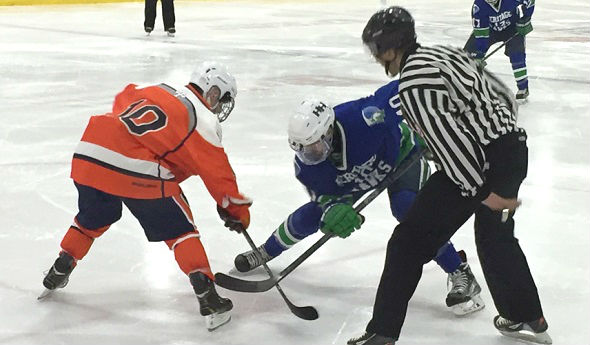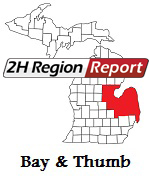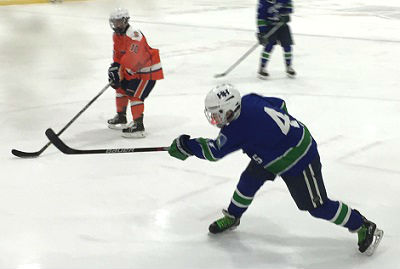
Heritage Rises to Top of New Division
February 10, 2016
By Bill Khan
Special for Second Half
SAGINAW TOWNSHIP — Conventional wisdom suggests that Saginaw Heritage received an easier path to an MHSAA hockey championship with its drop from Division 2 to Division 3 this season.
 While competing against smaller schools might improve a team's championship hopes in other sports, that scenario doesn't apply to hockey.
While competing against smaller schools might improve a team's championship hopes in other sports, that scenario doesn't apply to hockey.
All three divisions in the MHSAA Tournament are loaded with traditional powerhouses. The big schools in Division 1, headlined by Detroit Catholic Central, obviously have strength in sheer numbers. In Division 2, Trenton and Birmingham Brother Rice hold their own against anybody year in and year out. Down in Division 3, the road to an MHSAA championship features formidable roadblocks in the form of non-public school heavyweights like Bloomfield Hills Cranbrook Kingswood and any team strong enough to survive a brutal Upper Peninsula Regional.
So, it's pretty much a case of picking your poison.
"I don't think it matters what division you're in," Heritage coach J.J. Bamberger said. "We saw we were in Division 3, and it doesn't matter. Our first-round game against Flint Powers isn't anything different than us being in our first game against Midland High or Midland Dow the last few years. It's not like it gets any easier in any division you're in. In Division 1, 2 or 3, there are a lot of good teams. Hancock, the Division 3 No. 4 team, just beat the No. 1 team in Division 2. It's not any easier wherever you are."
What seemed like a break for Heritage quickly changed when the opening-round pairings were drawn. Right off the bat, the Hawks will face one of the premier Division 3 programs in the state in Flint Powers Catholic at 6 p.m. Feb. 29 at Saginaw-Bay Ice Arena, the Hawks' home rink. Powers has been in the Quarterfinals 14 times in 16 years of Division 3 play, winning a record 32 Regional championships since the MHSAA began sponsoring a hockey tournament in 1974-75.
It will be Heritage's first postseason game in Division 3 after being a Division 2 squad ever since the MHSAA went to a divisional format in 2000. Heritage has made the Quarterfinals six times in Division 2, reaching the Semifinals three times.
Having home-ice advantage against Powers will be a boost for the Hawks, though they may not need one. They have already made a statement to the rest of Division 3, going into Powers' home arena on Feb. 2 and skating off with a decisive 5-2 victory over a team that was riding a 12-game unbeaten streak and No. 2 ranking in Division 3 at the time.
"They're pretty deep," Powers coach Travis Perry said. "Their top line has got a lot of speed, and they gave us a lot of problems. We have to find a way to get ready for them."
That victory put Heritage in sole possession of first place in the Saginaw Valley League, the only thing that mattered to the Hawks on that night. Any thoughts of the game being a postseason preview were brushed aside.
"It's a big win," junior goalie Danny Yockey said. "We haven't won the Saginaw Valley League in seven years; it's ours to lose now."
"It's part of our process of trying to win our league," Bamberger said. "We're taking it one game at a time. We're not worried about anything come playoff time. I told the guys, 'Let's not make this about anything other than tonight.'"
Perhaps an even greater statement was made the following weekend when Heritage ended Hancock's 11-game winning streak, beating the currently second-ranked Bulldogs 4-3 on Feb. 5 in Trenton. The next day, the Hawks won 3-0 over Grand Rapids Forest Hills Central, which was No. 14 in Division 3 last week.
A four-game winning streak following an 11-1 loss to Toledo St. Francis on Jan. 29 had the Hawks at 17-2 and ranked No. 6 in Division 3 entering this week. The most recent rankings, which came out Wednesday, saw Heritage climb to the top spot.
"It's the chemistry," junior forward Sam Spaedt said. "Most of us juniors and seniors mesh together. We're having fun in the locker room. We're having fun on the ice. The coaches are great, too. The leadership is good. That's what's getting the job done."
Spaedt is far and away Heritage's leading scorer with 42 points, but there's plenty of depth throughout the rest of the lineup. Devan Bayne has 27 points, Gavin Dietrich 26, Chris Cornford 21, Zach Dornseifer 20, Brandon Ashley 17, Hunter Parasiliti 17 and Spencer Vondette 16.
Dietrich's 15 goals and Spaedt's 31 assists are team highs.
"We have a lot of forwards who can really go and really skate," Bamberger said. "We get some different scoring from different lines. I don't consider our fourth line a fourth line, because a fourth line generally doesn't play. Our fourth line not only plays, but they contribute. Each line had a goal (against Powers). From a tenacity standpoint, our guys keep going, keep going; you're going to wear teams down."
 Spaedt has been the consummate setup artist for the Hawks, with his point total leaning heavily toward assists. He has 11 goals to go with his 31 assists. Three of those goals have come while shorthanded. His goals have come in bunches, with four two-goal games. He's had at least three assists five times.
Spaedt has been the consummate setup artist for the Hawks, with his point total leaning heavily toward assists. He has 11 goals to go with his 31 assists. Three of those goals have come while shorthanded. His goals have come in bunches, with four two-goal games. He's had at least three assists five times.
"I'm always in a pass-first mentality," Spaedt said. "The guys are great. They bury the puck after I give it to them. If I have a chance to score, I'll take it. I'm happy if the guys give me the puck. The team really meshes well; that's part of the points, too."
For all of his playmaking prowess, Spaedt still ranks third on the team in goals.
"He scores, too," Bamberger said. "To be honest with you, I didn't realize that he's got (11) goals and 30-some assists. I think it's because he's a real smart player. More so than that, we have a lot of finishers on our team. We have a lot of guys who can put it in the net. Whoever he's giving it to, they're putting the puck in the net."
Yockey has played the majority of minutes in goal for Heritage, posting a 12-2 record, a 2.64 goals-against average and an .888 save percentage. In his last three games, all against state-ranked Division 3 teams, he has a 1.67 GAA and a .929 save percentage. Devin Wolfgang is 4-0 with two shutouts, a 0.57 GAA and a .966 save percentage as the backup goalie.
"The forwards are really good at back-checking and we're just smart in our zone," Yockey said.
Before Heritage can focus on the rematch with Powers, the Hawks will look to close out the Saginaw Valley championship with games against Mount Pleasant tonight and Bay City Central on Feb. 17. The pre-tournament tuning-up phase will include a game against Howell, the seventh-ranked team in Division 1, on Feb. 24.
 Bill Khan served as a sportswriter at The Flint Journal from 1981-2011 and currently contributes to the State Champs! Sports Network. He can be reached at [email protected] with story ideas for Genesee, Lapeer, St. Clair, Sanilac, Huron, Tuscola, Saginaw, Bay, Arenac, Midland and Gladwin counties.
Bill Khan served as a sportswriter at The Flint Journal from 1981-2011 and currently contributes to the State Champs! Sports Network. He can be reached at [email protected] with story ideas for Genesee, Lapeer, St. Clair, Sanilac, Huron, Tuscola, Saginaw, Bay, Arenac, Midland and Gladwin counties.
PHOTOS: (Top) Saginaw Heritage’s Mitch Wise, right, prepares for a faceoff during a recent game against Flint Powers Catholic. (Middle) Leading scorer Sam Spaedt rips a shot for the Hawks. (Photos by Bill Khan.)

Officials Eager for New Hockey Format
July 12, 2019
By Rob Kaminski
MHSAA benchmarks editor
Tuesday, Feb. 26, was a particularly busy day on the ice as the 2019 MHSAA Ice Hockey Tournament reached just its second day around the state.
On the slate that night were 27 Regional games, bringing the two-day total to 48 on the heels of Monday’s busy calendar.
As teams were busy setting their sights on the ultimate goal, so, too, was another group of accomplished skaters who toil with much less fanfare. Nonetheless, the games can’t start without them – the folks in the striped shirts who call the games.
Just as players and coaches will welcome the expanded playoff format in 2020, the officials are looking forward to the change as well.
“When we got to the first week of the tournament, it seemed like we were going every day,” said Jim Gagleard, who assigns officials for the Livonia Ice Hockey Officials Association. “There are only so many officials to go around in any sport. By allowing us as officials a day or two to catch our breath, it’s good. Good for us, and good for players more than anything.”
If it seemed like every day, well, it was. A total of 66 games were played over the first three days, and 89 over the first four. Considering each game at the Regional level has three officials, that computes to 267 officials needed during that span. On the busiest day, 81 had to take to the ice.
Given that there were a total of 302 playoff-eligible officials in 2019, filling those slots can be a logistical nightmare for assigners at times.
“Regional week will see a huge burden alleviated for officials and especially assigners. There will be so much more flexibility under the new format,” said Dan DiCristofaro, President of the Northeast Hockey Referees Association. “Last year, we were faced with so many doubleheaders at single sites, and the first games needed an early start so that the second games would not last late into the evening on school nights.
“At times, the most important factor for the assigner was scheduling those officials who could get to the arena for the early start times. Merit and ability sometimes had to take a back seat.”
Gagleard agrees, saying, “Assigning-wise, early games are the toughest to fill. Everyone has a job, and in order to work a game they have to tell the boss they’re leaving at 2:30 for a 5 o’clock game. You start to look for officials who are retired, or can get out of work, instead of the most qualified. That’s not fair to the teams playing.”
In the northern reaches of the Upper Peninsula, the problem is more acute.
Sean Jacques is the athletic director at Calumet, and also an experienced official, having skated the Division 2 Final in Plymouth in 2016.
“Not enough,” Jacques said, in reference to the number of playoff officials in the UP. “Not enough. When I get the list of eligible officials that is sent to tournament managers, I have to search and scramble to find three people within an 80-mile radius.”
Moving the Quarterfinals to the weekend will definitely help matters, and eliminating Regional doubleheaders should ease the scheduling anxiety as well.
 “With Regionals spread out more, without doubleheaders, officials potentially could work more days,” Jacques said. “And there should be more availability for the Quarterfinals. The last few years, it was in the Sault, and getting four guys to the Sault on a weeknight, whether from Escanaba or northern lower Michigan, was difficult. There were times I’d turn down a Quarterfinal because I just couldn’t get there and back and make it to work the next day. Saturday makes it easier.”
“With Regionals spread out more, without doubleheaders, officials potentially could work more days,” Jacques said. “And there should be more availability for the Quarterfinals. The last few years, it was in the Sault, and getting four guys to the Sault on a weeknight, whether from Escanaba or northern lower Michigan, was difficult. There were times I’d turn down a Quarterfinal because I just couldn’t get there and back and make it to work the next day. Saturday makes it easier.”
On the west side of the Lower Peninsula, assigner Randy Sheahan uses a mathematical approach to illustrate his challenges, even for the regular season. Sheahan calculates that 98.88 percent of all West Michigan games are scheduled for Wednesday, Friday, or Saturday. Breaking it down further, 84.39 percent skip Wednesday and schedule only Friday or Saturday.
With the shortened regular season coming in 2019-20 to allow for a three-week tournament window, Sheahan took a proactive approach.
“When the MHSAA announced the change to a three-week tournament, I emailed all West Michigan coaches, plus a handful of athletic directors and booster leaders who may be involved in team scheduling,” Sheahan said. “I encouraged them if they are having difficulty squeezing all their games into a window which is now one week shorter, to give further consideration to playing on Mondays, Tuesdays, or Thursdays to greatly alleviate some of the stresses we place on the West Michigan officiating staff.”
As for the MHSAA Tournament, Sheahan agrees with his brethren across the state in metro Detroit that the expansion will benefit assigners, officials, and teams.
“I only see positives,” Sheahan said. “This gives me tremendous flexibility with our staff to maneuver around their professional and personal schedules to keep our best officials on the ice every round, which is an expectation teams have for playoffs. It also provides (at times) much needed rest for officials and teams, especially if they are involved in overtime affairs. This could help with the quality of overall game play.”
That’s the goal for everyone. Fresher legs for players and officials alike will provide a better experience for all involved.
“This allows for physical recovery for everyone on the ice,” said DiCristofaro. “It also allows for better time management for student-athletes, officials and coaches. Even at the Quarterfinal offerings with four officials for each game, we’d run into issues as far as which people could get to places, or wanted to travel and skate late on a work night. Saturday give us much more flexibility and should create more interest in the state tournament.”
The Quarterfinals, Semifinals and Finals have employed a four-official system in recent years, affording an extra position each game for deserving officials while adding to the quality of the game for participants at the highest level.
Sheahan plans to utilize the new format to continue to reward those among his troops who have earned their stripes for such contests.
“In theory, I may have opportunities to increase game counts for some of our perennial playoff officials, but I have no plans to do that,” Sheahan said. “We have other officials every season who are good enough to skate playoffs and have earned it, but simply couldn’t quite break the playoff bubble. Now the opportunity presents itself to reward some of those officials. It would be counterproductive to officiating development if fewer officials are getting opportunities for important games.”
Similarly, DiCristofaro is hoping the time will come when four officials will be assigned to skate Regional Finals, and perhaps the new length of the postseason will open the door.
“Some of most important games are the Regional Finals. Maybe this new schedule can help,” DiCristofaro said. “Four officials offer teams the best possible ice coverage, and they deserve that.”

